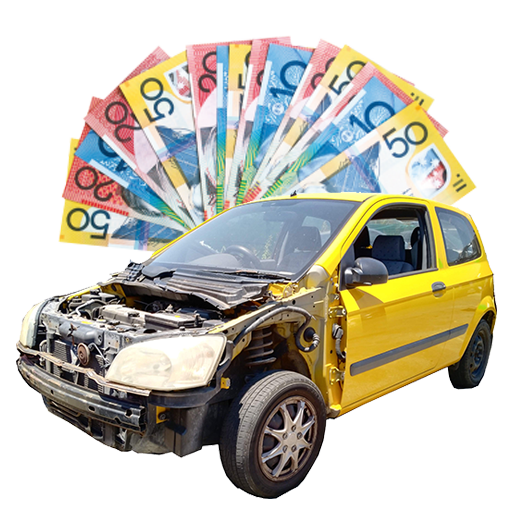When you scrap a car, you're not selling it for its ability to drive—you're selling it for the raw materials it's made of. The final cash offer boils down to the weight of the metal, the current market price for that metal, and your vehicle's specific make and model. It's a bit like selling flour, sugar, and eggs instead of a finished cake.
How Is My Scrap Car Value Really Calculated?
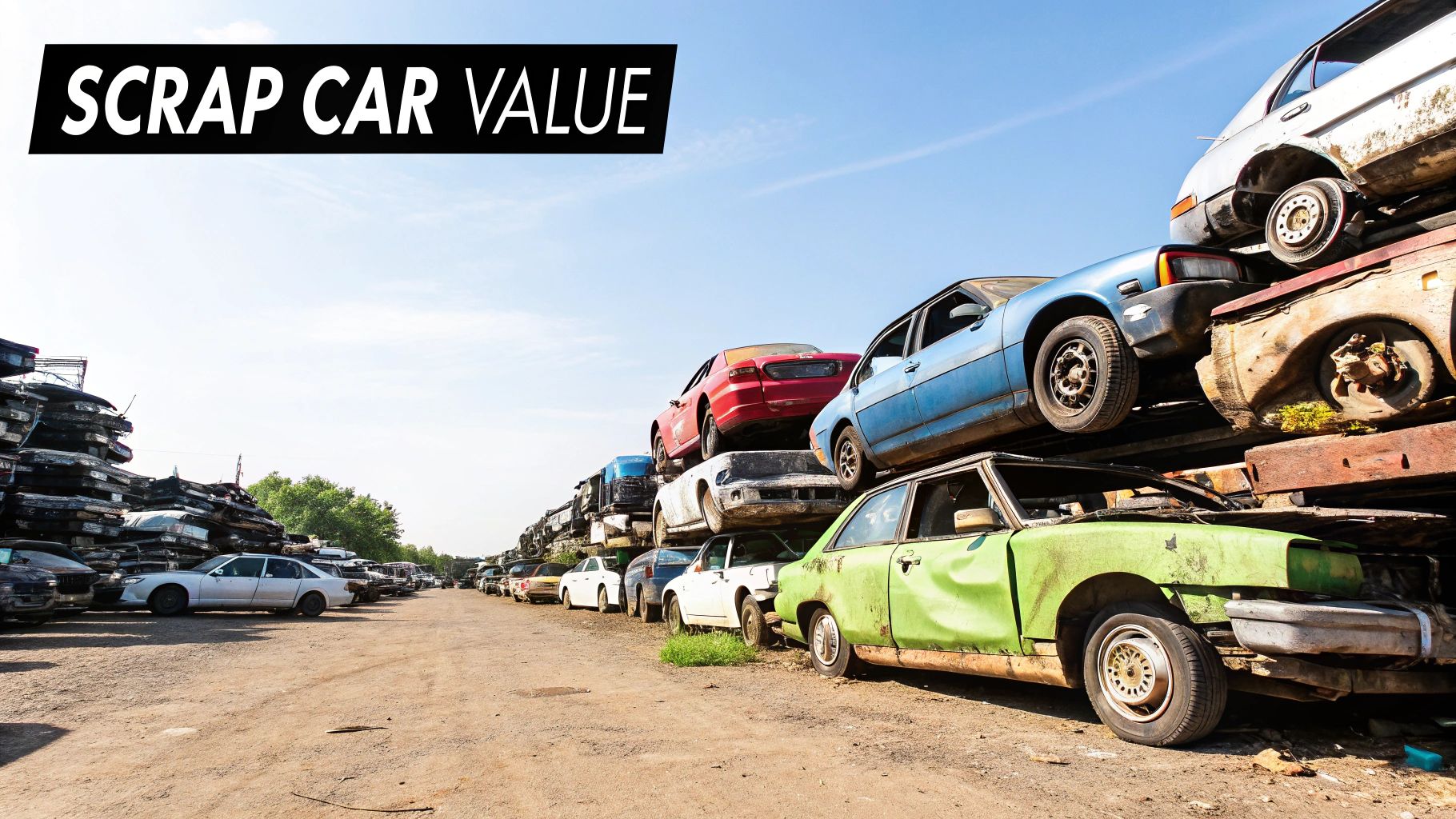
Figuring out what your scrap car is worth starts with a simple change in how you see it. You're not selling a car anymore; you're selling a bundle of valuable raw materials—mostly steel, but also aluminium, copper, and more. Even a sedan that won't start has real value because it’s packed with these recyclable metals.
This is exactly why things like cosmetic damage, a blown engine, or a failed transmission often don't make much difference to the final price. It's a weight game, pure and simple.
Heavier vehicles mean more metal, which naturally translates to a bigger payout. A hefty 4×4 or a commercial van will almost always fetch a better price than a little hatchback, just because there's more of it to recycle.
The Key Factors in Your Offer
A few core elements come together to create the cash offer you'll get. Understanding these pulls back the curtain on the process and helps you know what to expect.
Here’s what really influences your scrap car's value:
- Vehicle Weight and Size: This is the big one. The heavier the car, the more metal it has, and the more it's worth.
- Make and Model: Some models are built with more valuable metals like aluminium, or they might have specific parts that can be salvaged and resold.
- Current Scrap Metal Prices: Just like stocks, metal prices go up and down daily based on global supply and demand.
- Your Location: How close you are to the scrap yard matters. If they have to travel a long way to pick up your car, transport costs can slightly lower the offer.
To put it all into perspective, the average scrap car in Australia is worth around $500 AUD. But that's just an average. A small car might only get you $200-$300, while a large SUV or ute could bring in over $600.
Estimated Scrap Car Value by Vehicle Type
To give you a clearer idea of what your car might be worth, we've put together a quick guide based on vehicle type. These are just estimates, but they provide a solid starting point for setting your expectations.
| Vehicle Type | Typical Scrap Value Range (AUD) |
|---|---|
| Small Car (e.g., Hatchback, Sedan) | $200 – $450 |
| Medium SUV / Ute | $400 – $700 |
| Large 4WD / Van | $500 – $1,000+ |
| Commercial Truck | $800 – $5,000+ |
Remember, the final price depends on the factors we've discussed, especially the real-time price of scrap metal.
The easiest way to find out what your specific car is worth is to use an online tool. Our scrap car value calculator can give you an instant quote. For a deeper dive into the valuation process, you can also check out this great resource on how much scrappage your car is worth.
What's My Scrap Car Really Worth? The 4 Key Factors
When it comes to getting a cash price for your old car, it's not just a random number plucked out of the air. There are four main ingredients that every scrap yard uses to cook up their offer. Once you get a handle on these, you'll have a much clearer idea of what your vehicle is worth and why.
Let's break them down.
1. Weight and Size: The Heavy Hitter
First and foremost, it's all about the metal. The weight and size of your car are the single biggest factors determining its scrap value. Think of it this way: scrap yards buy cars to recycle the steel, aluminium, and other metals.
A big, heavy ute like a Holden Colorado has a lot more metal than a zippy little Mazda 3. That means more recyclable material, which translates directly to a higher payout for you. It’s simple maths: more weight equals more cash.
2. Make and Model: The Hidden Value
While weight is king, the make and model of your car also play a part. Some vehicles are just built with more valuable materials, like higher quantities of aluminium in their engine blocks or body panels.
Beyond that, specific parts might be in high demand. If your car has a sought-after catalytic converter, a working transmission, or specialty alloy wheels, a savvy wrecker might offer a bit more because they can salvage and resell those components.
3. Current Scrap Metal Prices: The Global Market
This is the one factor that’s completely out of your hands. The price of steel, copper, and aluminium changes daily, driven by global supply and demand—a bit like the stock market. An offer you get this week could be slightly different next week simply because the market has shifted.
It’s always a good idea to have a rough sense of which way the market is trending. For a closer look at the numbers, check out the latest scrap metal car prices to see how these rates move.
4. The Car’s Condition: What Really Matters
This one often surprises people. When you’re scrapping a car, its overall condition is judged very differently than if you were selling it secondhand.
Cosmetic issues? Dents, scratches, peeling paint? They don't really matter. A scrap dealer is looking at the car's core components. What will lower the value is if major parts are missing, like the engine, transmission, or catalytic converter. Heavy rust can also be a problem as it reduces the amount of usable metal.
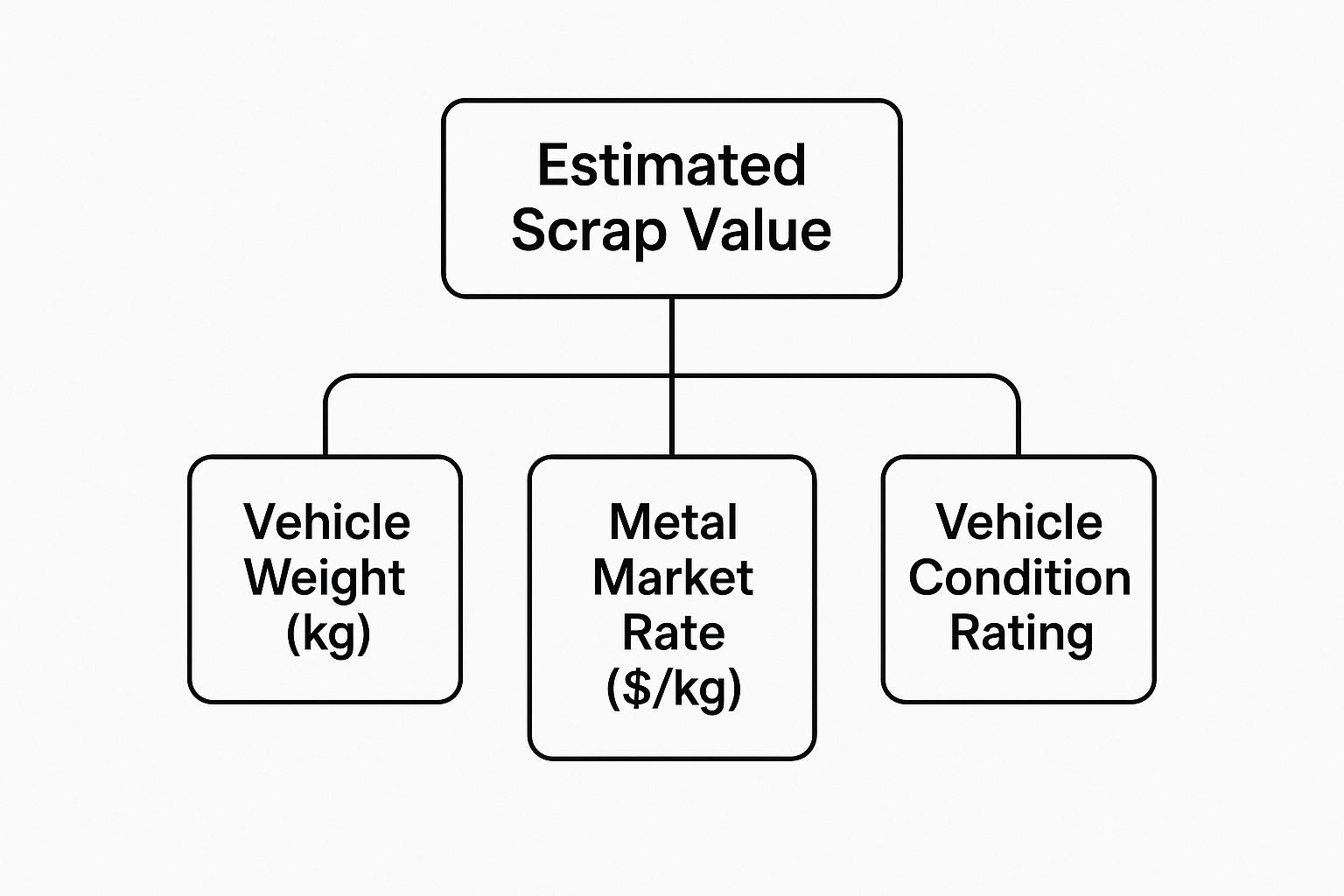
Ultimately, your car's final price tag comes down to a combination of its physical weight, the current market rate for metal, and whether all its key parts are still there.
Why Your Location Changes the Price You Get
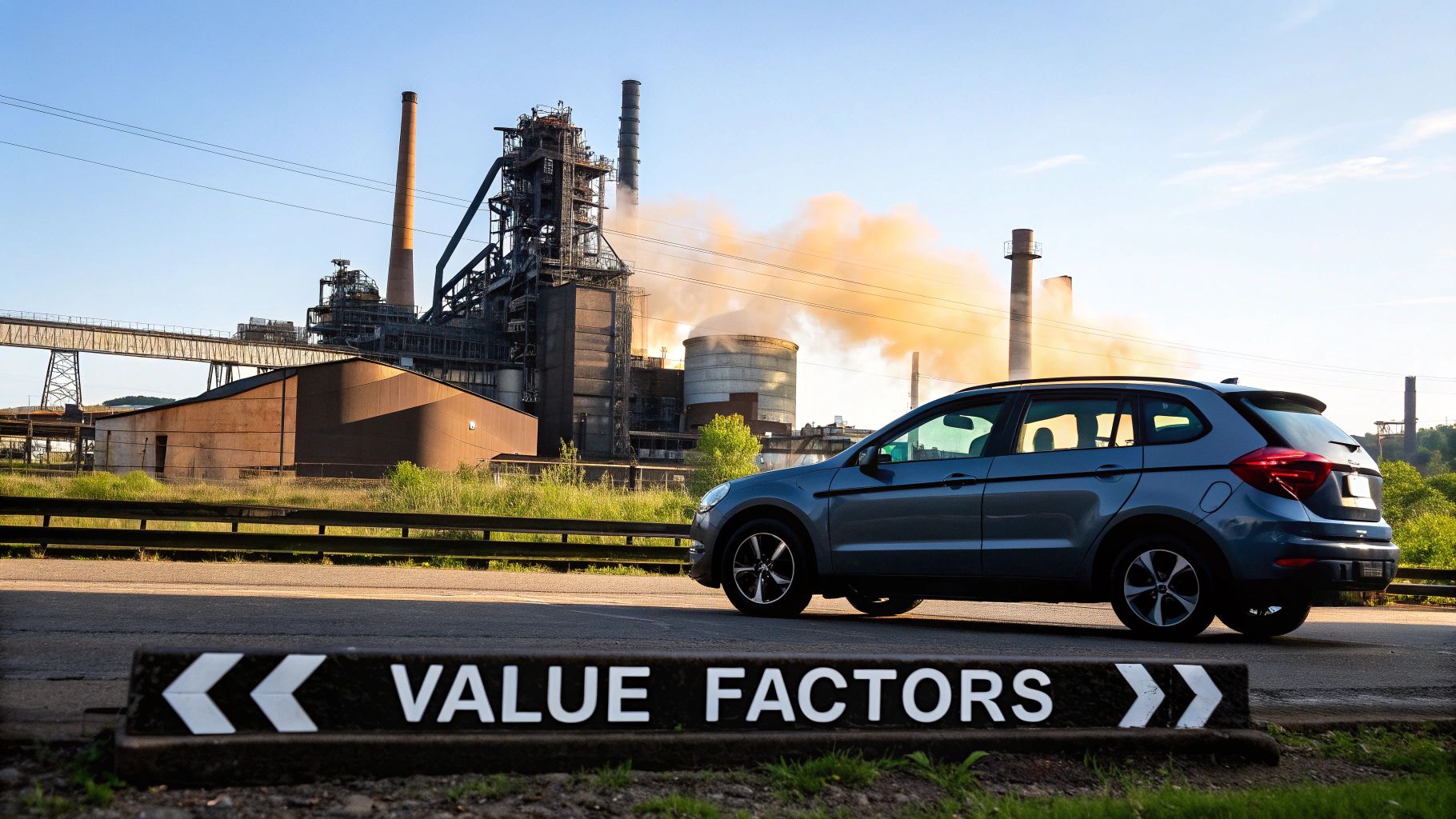
It might seem odd, but where your car is parked can have a massive impact on its scrap value. Think of it like this: ordering a pizza from a place down the road is cheaper than getting it delivered from across town. It’s the same principle for scrapping a car.
Distance costs money, and in this business, that cost usually comes out of your final payment.
A scrap yard in a busy metro area like Adelaide has plenty of competitors nearby and lower transport costs. This environment naturally drives up the offers they make. On the flip side, if your car is sitting in a remote country town, the tow truck driver has a long way to go, burning more fuel and time.
These travel expenses are simply deducted from what your car’s metal is worth. It's a basic business reality that directly affects how much cash ends up in your pocket.
Local Demand and Competition
The number of scrap yards in your local area is a huge factor. More competition means buyers have to offer better prices to secure your car. A lone yard out in a rural area? They have no real reason to offer top dollar when they're the only game in town.
The bottom line is that proximity matters. The closer you are to a busy hub of recycling yards, the more bargaining power you have and the better your offer is likely to be.
Local demand for scrap metal can also create price hotspots around the country. One state might have a higher need for recycled steel because of its manufacturing industry, which can push prices up. For instance, the Queensland market often sees sedans fetching $500 to $550, while hefty 4x4s can go for as much as $1,000, all thanks to regional conditions.
This is exactly why getting quotes from a few different local buyers is non-negotiable. By checking out a few different auto wreckers near you, you’ll get a much clearer picture of what your car is truly worth in your specific area.
Ever wondered if what's happening at your local car dealership has anything to do with the cash you'll get for your old clunker? It absolutely does. The value of your scrap car isn't set in a vacuum; it’s directly tied to the ebbs and flows of the broader used car market.
Think of it like this: when the used car market is booming, demand for pre-owned vehicles is through the roof. Suddenly, that old car in your driveway might be worth fixing up and selling privately. This means fewer cars end up at the scrap yard, and with a smaller supply, wreckers sometimes have to offer a bit more to get the inventory they need.
What Happens When the Market Slows Down?
On the flip side, when the used car market cools off, scrapping often becomes a much more practical choice. As shiny new cars roll onto lots, the supply of used vehicles swells, and prices start to fall. That car that was borderline worth repairing a few months ago? Now, it's probably a money pit, making the scrap yard look very appealing.
This is precisely what we've been seeing in Australia. As the market started to balance out through 2025, used car prices softened noticeably. You can get a deeper dive into these trends over at skipthedealer.com.au. For scrap car owners, this kind of market shift can be good news.
Here's the bottom line: A cooling used car market can be a great time to scrap your vehicle. Your car becomes a more sought-after commodity for recyclers when it’s no longer a hot ticket item on the private sale market.
Keeping an eye on these trends gives you a real advantage. It helps you pick the right moment to make a move and get the best possible scrap car value. It’s a reminder that the price you're offered isn't just about the metal in your car—it's also about the economic climate on car lots all over the country.
A Practical Guide to Getting the Best Price
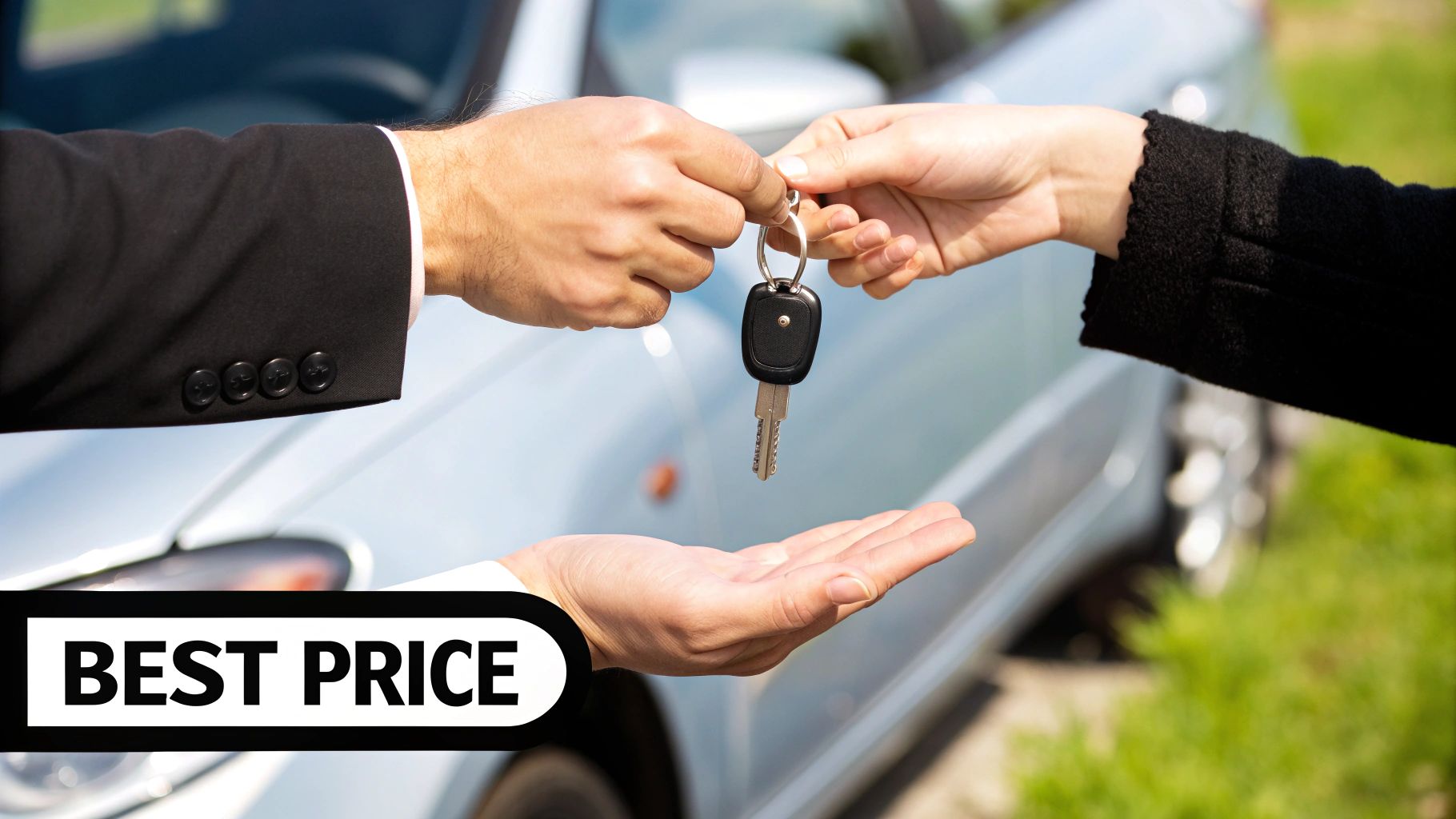
Knowing how your scrap car's value is calculated is one thing, but turning that knowledge into cash in your pocket is another. To make sure you’re getting top dollar, you need a bit of a game plan. It’s not complicated, but a few smart moves can make a real difference to your final payout.
The single best thing you can do? Get multiple quotes. Never, ever take the first offer that comes your way.
Reach out to at least three different scrap yards or car removal services. This simple step forces them to compete for your car and gives you a realistic idea of what the market is willing to pay right now.
Getting Your Car Ready for its Final Ride
Before the tow truck driver shows up, a little bit of prep work goes a long way. Think of it as a final clean-out that prevents headaches and ensures the deal goes off without a hitch.
Here’s a quick checklist to run through:
- Clear Out Your Stuff: Check everywhere – the glove box, under the seats, in the boot. Once that car is towed, your personal items are gone for good.
- Sort Out Your Paperwork: You’ll need to prove you own the car. Have your registration papers or title handy, along with your photo ID. Being prepared makes the handover super quick.
- Cancel Registration and Insurance: As soon as you’ve locked in a pickup time, get in touch with your state's transport authority to cancel the rego. Don't forget to call your insurer, too.
A word of advice: always ask about extra charges before you agree to anything. A reputable buyer will include free towing in their offer, but you need to confirm there are no hidden "admin fees" or other surprises.
A simple, direct question like, "Is the price you quoted the exact amount I'll receive?" can save you a lot of grief. It clarifies that the scrap car value they offered is what you’ll actually get paid on the day.
Common Questions About Scrapping a Car
Even with a good grasp of how scrap car values are worked out, you're bound to have a few questions floating around. Let's tackle some of the most common ones so you can move forward with total clarity.
Does My Car Need to Be Registered to Scrap It?
Nope, you don't need current rego or a roadworthy certificate to scrap your car. What you absolutely must have is proof of ownership. This is non-negotiable.
You'll need to present the vehicle's title or the original registration papers, along with your photo ID, to prove you’re the legal owner.
Will I Get a Better Price if the Car Still Runs?
This really comes down to who you’re selling it to. A classic scrap metal dealer is paying you for the weight of the metal, period. To them, a running engine doesn't add much, if any, value.
On the other hand, an auto wrecker or a "cash for cars" business might offer a bit more. They can salvage working parts from your car and sell them on, so a running vehicle has more potential for them.
If your car still starts, it's smart to get quotes from both types of buyers. You never know who will see the most value in it, and a couple of quick phone calls could mean more cash in your pocket.
How Fast Can I Get Rid of My Car and Get Paid?
The whole process is built for speed. Once you agree to a price, most services can schedule a pickup within 24 to 48 hours.
The actual removal is super quick – often less than 30 minutes. Best of all, payment is usually made right then and there, either in cash or with an instant bank transfer.
Should I Bother Selling Parts Myself Before Scrapping?
You can sometimes squeeze a bit more money out of an old car by selling off valuable components yourself – think the battery, alternator, or a good set of tyres.
But here’s the trade-off: it takes time, a bit of mechanical skill, and the hassle of dealing with individual buyers. Plus, removing parts might slightly reduce the final scrap offer. For most people, the sheer convenience of having it all taken care of in one simple transaction outweighs the small extra profit from parting it out.
Ready to turn your old car into instant cash? At Auto Removal Adelaide, we offer top dollar for unwanted vehicles with free removal across Adelaide. Get your instant quote today at https://autoremovaladelaide.com.au.

